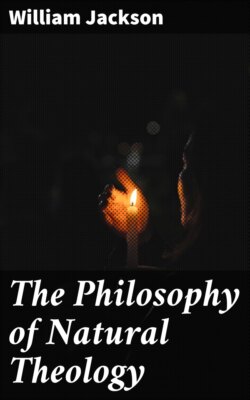Читать книгу The Philosophy of Natural Theology - William Jackson T. - Страница 8
На сайте Литреса книга снята с продажи.
B.—ON CORRUPTION OF THE JUDGMENT BY MISDIRECTED MORAL SENTIMENTS.
ОглавлениеTalfourd—then Mr. Serjeant Talfourd—thus describes what passed in his own mind when viewing the site of Gibbon's abode at Lausanne:—"That garden in which the Historian took his evening walk, after writing the last lines of the work to which many years had been devoted;—a walk which alone would have hallowed the spot, if, alas! there had not been those intimations in the work itself of a purpose which, tending to desecrate the world, must deprive all associations attendant on its accomplishment of a claim to be dwelt on as holy! How melancholy is it to feel that intellectual congratulation which attends the serene triumph of a life of studious toil chilled by the consciousness that the labour, the research, the Asiatic splendour of illustration, have been devoted, in part at least, to obtain a wicked end—not in the headlong wantonness of youth, or the wild sportiveness of animal spirits, but urged by the deliberate, hearted purpose of crushing the light of human hope—all that is worth living for, and all that is worth dying for—and substituting for them nothing but a rayless scepticism. That evening walk is an awful thing to meditate on; the walk of a man of rare capacities, tending to his own physical decline, among the serenities of loveliest nature, enjoying the thought that, in the chief work of his life, just accomplished, he had embodied a hatred to the doctrines which teach men to love one another, to forgive injuries, and to hope for a diviner life beyond the grave; and exulting in the conviction that this work would survive to teach its deadly lesson to young ingenuous students, when he should be dust. One may derive consolation from reflecting that the style is too meretricious, and the attempt too elaborate and too subtle, to achieve the proposed evil; and in hoping that there were some passages in the secret history of the author's heart, which may extenuate its melancholy error; but our personal veneration for successful toil is destroyed in the sense of the strange malignity which blended with its impulses, and we feel no desire to linger over the spot where so painful a contradiction is presented as a charm."—Vacation Rambles. Ed. 2, p. 238.
We may gladly give Gibbon the benefit of the doubt with which the great judge closes. But surely most attempts to address the mental state depicted must needs be found impotent. There is great force in a dictum of Schelling's ("Idealismus der Wissenschaftslehre") to the following effect—"The medium by which spirits understand each other is not the ambient air, but the deep-stirred sympathetic vibrations propagated by a community of spiritual freedom. When a soul is not pervaded by this atmosphere of conscious freedom, all inward communion with self or with another is broken,—what wonder, then, if such a one remain unintelligible to himself and to others, and in his fearful wilderness of spirit wearies himself by idle words, to which no friendly echo responds, either from his own or from another's breast?
"To remain unintelligible to such an one is glory and honour before God and man. Barbarus huic ego sim, nec tali intelligar ulli. This," concludes Schelling, "is a wish and prayer from which no man can keep himself."—Sämmtliche Werke, I. 443.
